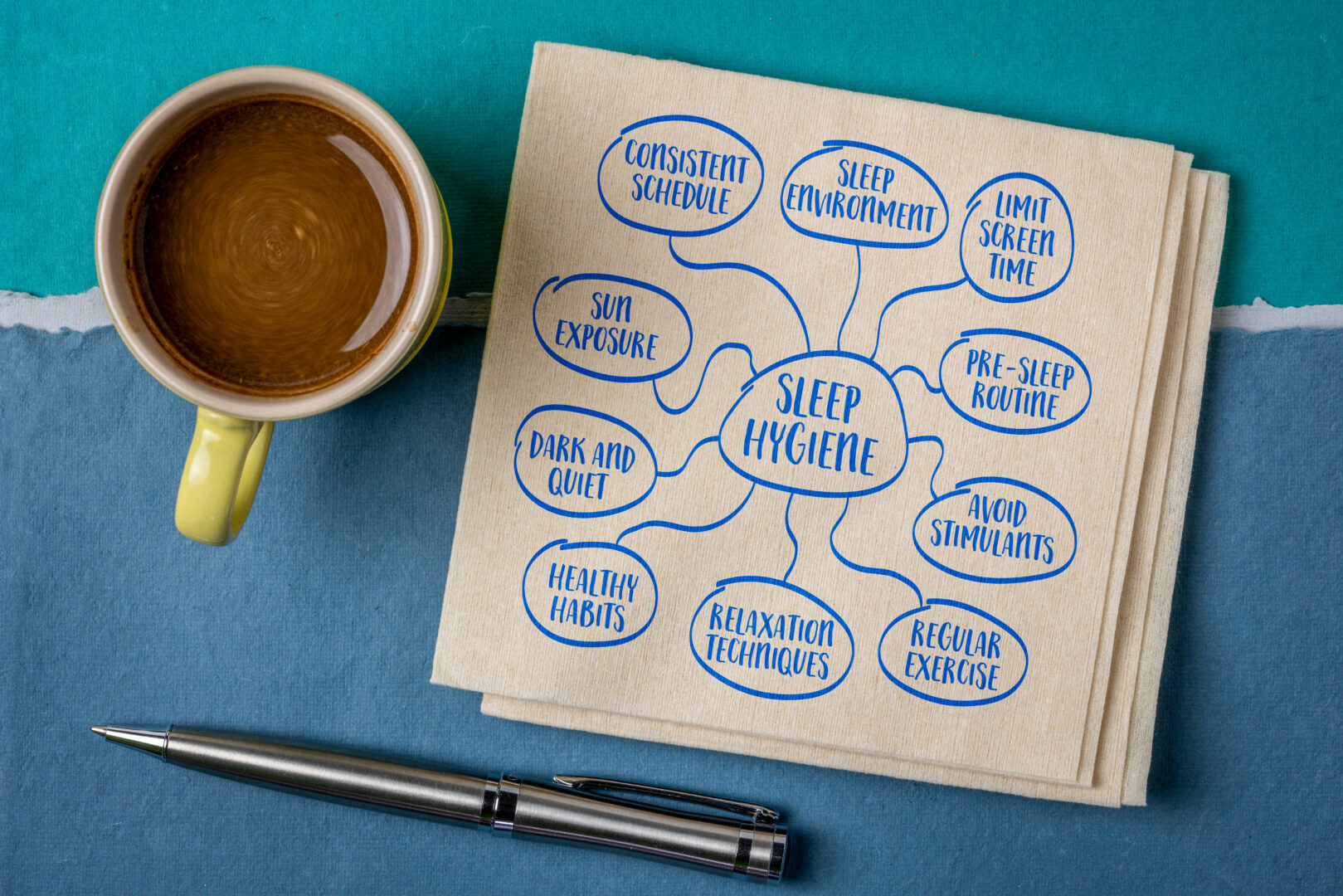It’s 3 AM, and you’re staring at the ceiling, thoughts racing. You know that tomorrow is going to be rough. Waking up in the middle of the night always leaves you feeling groggy, stressed, and unproductive the next day.
As the Clinical Director of Counselling Services at TELUS Health MyCare™, waking up in the night is an issue we hear about often. Here are some proven strategies I recommend to help you fall back asleep quickly, as well as long-term habits to work on to get the quality sleep you need.
Middle-of-the-night wake-ups can stem from a variety of factors, including:
- Stress or anxiety: Chronic and acute stress can prevent the body from falling and staying asleep.
- Aging: Natural changes in sleep patterns make night waking more frequent.
- Lifestyle factors: Caffeine, alcohol, nicotine, shift work, lack of exercise, and inconsistent bedtimes can disrupt your sleep cycle.
- Environment: Bright lights, noise, or an uncomfortable room can disturb rest.
- Health-related causes: Pain, medication, hormones, or conditions like sleep apnea and insomnia can play a role.
Identifying your triggers is the first step toward better sleep.

Quick tips to fall back asleep
Get out of bed
It might feel counterintuitive, but staying in bed and waiting for sleep to return often makes things worse. Get up, drink water, read a book, or listen to an audiobook. This breaks the cycle of spiralling thoughts and helps reset your mind for sleep.
Write your worries down
One way to curb spiralling thoughts in the middle of the night is to write down what’s on your mind. Jotting things down on a page can help them feel small, contained and more manageable to tackle in the morning.
Don’t look at your phone
Jot down any thoughts or worries keeping you awake. Seeing them on paper helps them feel smaller and easier to tackle in the morning.
Avoid your phone
It’s tempting, but it won’t help you fall back asleep. Scrolling through emails or social media reactivates your brain, making it harder to unwind.
Use a Bluetooth speaker if you like falling asleep to a meditation or audiobook. Switch to a traditional clock for your morning alarm to keep electronics out of reach.
Reset your bedtime routine
Repeat your usual pre-bedtime routine: brush your teeth, use the washroom, or dim the lights. These familiar actions signal your body that it’s time to sleep.

Build long-term habits for better sleep
Falling back asleep is easier when you’ve established a set of habits and practices that promote good sleep. Incorporate these into your routine:
Create a sleep-friendly environment
Your sleep space plays a significant role in helping you stay asleep. Here’s how to optimize it:
- Cool temperature: Keep your room at 18.3°C for optimal sleep.
- Dark: Use blackout curtains or an eye mask to block light.
- Quiet: A fan or white noise machine can help drown out city noise.
- Clutter-free: A clean, tidy space promotes relaxation.
- Electronics-free zone: Remove distractions like TVs and smartphones.
Developing good sleep habits long-term can help improve your ability to fall asleep quickly and stay asleep.
Stick to a schedule
Go to bed and wake up at the same time every day, even on weekends. Consistency trains your body to recognize sleep and wake cues.
Brush your teeth, read, turn off lights, and have a pee in more or less the same order at the same time every night. This signals your brain that it’s time to relax and get ready for slumber.
Wind down before bed
Turn off screens 30–60 minutes before bedtime. Instead, read a book, meditate, or listen to relaxing music. Consistently doing this is another way to signal to your brain that sleep is coming soon.
Exercise daily
Even light exercise, like a 20-minute walk, can improve sleep quality. Make it part of your daily routine to help you fall asleep faster and stay asleep longer.
Limit alcohol and caffeine
Alcohol may help you fall asleep quickly, but it disrupts your sleep cycle, causing restlessness or waking up during the night. Reducing alcohol and caffeine, especially in the evening, can improve sleep quality.
When to seek help
If you consistently wake up and struggle to fall back asleep, it may be time to consult a healthcare professional, like a counsellor with TELUS Health MyCare™. Addressing underlying issues like stress, anxiety, or medical conditions can make a big difference in your sleep quality.
Do you have a trick for falling asleep quickly and easily in the middle of the night? Go ahead and share it in the comments below!





I take 1 Magnesium Bis-Glycenate pill before bedtime. Let’s me sleep 5 + hrs straight.
Also, I keep a banana handy if I cannot get back to sleep easily.
Great tip!
~Canadian Men’s Health Foundation team member
I find that the suggestions are great – stay away from your phone and electronics and then this article suggests that there’s an app for getting back to sleep. Doesn’t that involve electronic?
Best practice is to keep electronics out of the room. But there are definitely times when using a meditation app can help when you REALLY need it. You can download some of the practices ahead of time, then you can keep your phone offline for the night still. Or, setup a Bluetooth speaker and leave the phone in another room.
~Canadian Men’s Health Foundation team member
I used to wake and worry about things and couldn’t get to sleep for hours. I read that breathing control could help and followed the suggestion of breathe out for 10 seconds, hold 10 seconds, breathe in 10 seconds, hold 10 seconds, repeat. I combined this with holding the image of a blank dark TV screen. The first few times it took 3 or 4 cycles. Since then I rarely finish a full cycle before waking hours later.
That’s a helpful tip. Thanks for sharing, Bruce. Breathwork is an incredible tool.
~Canadian Men’s Health Foundation team member
I found this article really interesting as I often wake up in the middle of the night for unclear reasons. Fortunately, I already do many of your suggestions which makes me feel better about what I am doing. Thanks for the reassurances.
Hi Bill,
We’re glad to hear that you’re already doing many of our suggestions in this article. We certainly hope that you’ll start seeing improvements in your sleep soon.
The Don’t Change Much Team